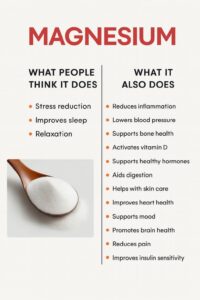
Magnesium is an essential mineral that plays a crucial role in over 300 biochemical processes in your body. Here’s everything you need to know about incorporating magnesium into your diet:
Why You Need Magnesium
– Supports muscle function and relaxation
– Promotes heart health by regulating blood pressure and heartbeat
– Aids in energy production and nerve function
– Helps maintain strong bones
– Relieves tension and anxiety
Recommended Daily Intake
– Adult men: 400-420 mg/day
– Adult women: 310-320 mg/day
– Pregnant women: additional 40 mg/day
Magnesium-Rich Foods
– Nuts and Seeds: almonds (80mg/1 oz), pumpkin seeds (156mg/1 oz)
– Leafy Greens: spinach (157mg/1 cup cooked), edamame (99mg/1 cup cooked)
– Legumes: lima beans (126mg/1 cup cooked), kidney beans (35mg/1/2 cup canned)
– Whole Grains: brown rice (86mg/1 cup), whole wheat bread (24mg/1 slice)
– Fish: tuna (109mg/6 oz)
Benefits of Magnesium
– Muscle Recovery: relaxes muscles and minimizes cramping
– Cardiovascular Health: promotes stable heartbeat and blood flow
– Bone Health: contributes to bone mineralization and density
– Neurological Function: supports nerve signaling and neurotransmitter balance
Signs of Magnesium Deficiency
– Fatigue
– Muscle cramps
– Weakness
– Nausea
– Abnormal heart rhythms
Supplements
– Consider taking magnesium supplements if you have a deficiency or experience symptoms
– Types of magnesium: glycinate (calming, long-term relief), citrate (digestive regularity, short-term use)
– Consult a healthcare provider before taking supplements.
